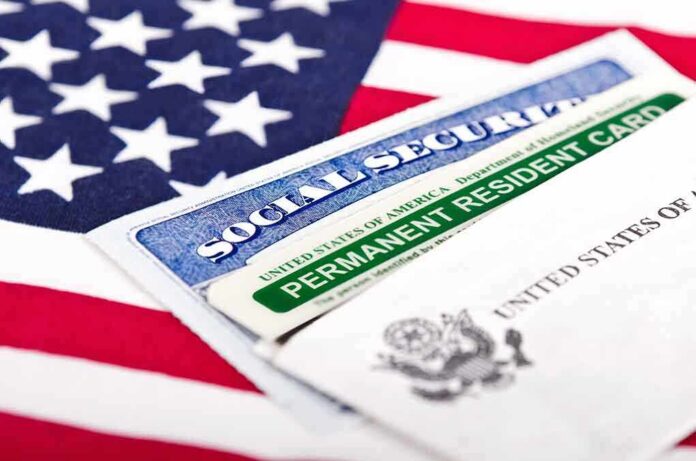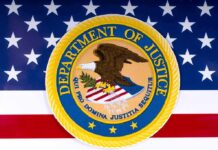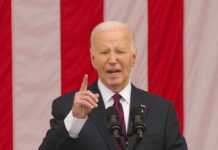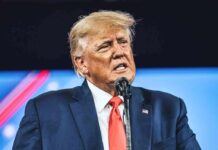House Judiciary Committee held a pivotal hearing on birthright citizenship that could reshape America’s immigration landscape and challenge long-standing constitutional interpretations of the 14th Amendment.
Quick Takes
- Expert witnesses including Charles J. Cooper, R. Trent McCotter, Matt O’Brien, and Amanda Frost testified before the House Judiciary Subcommittee on the Constitution and Limited Government
- The hearing focused on the interpretation of the Citizenship Clause of the 14th Amendment, which states “All persons born or naturalized in the United States, and subject to the jurisdiction thereof, are citizens”
- The Leadership Conference on Civil and Human Rights submitted a statement defending the traditional interpretation of birthright citizenship
- The Supreme Court’s 1898 ruling in United States v. Wong Kim Ark established that children born in the U.S. are citizens regardless of their parents’ citizenship status
- Any attempt to restrict birthright citizenship could create complex legal challenges and potentially establish a permanent underclass in America
Constitutional Experts Face Off on 14th Amendment Interpretation
The House Judiciary Subcommittee on the Constitution and Limited Government convened a hearing titled “‘Subject to the Jurisdiction Thereof’: Birthright Citizenship and the Fourteenth Amendment” on February 25, 2025. The session brought together prominent legal experts to examine the meaning and application of the Citizenship Clause within the 14th Amendment. Witnesses included Charles J. Cooper, Chairman and Founding Partner of Cooper & Kirk PLLC, R. Trent McCotter from Boyden Gray PLLC, Matt O’Brien of the Immigration Reform Law Institute, and Amanda Frost, Professor at the University of Virginia School of Law.
At the heart of the debate is the 14th Amendment’s language, which states: “All persons born or naturalized in the United States, and subject to the jurisdiction thereof, are citizens of the United States and of the State wherein they reside.” This constitutional provision, ratified in 1868 following the Civil War, has traditionally been interpreted to grant automatic citizenship to nearly all children born on U.S. soil, regardless of their parents’ citizenship or immigration status. The hearing specifically addressed the scope of the phrase “subject to the jurisdiction thereof” and its implications for children born to non-citizens.
LIVE: House Judiciary Committee's Hearing on Birthright Citizenship and the 14th Amendment https://t.co/N5Y6t5jFZN
— NTD News (@NTDNews) February 25, 2025
Civil Rights Organizations Defend Traditional Interpretation
The Leadership Conference on Civil and Human Rights, America’s oldest and largest civil rights coalition representing over 240 national organizations, submitted a formal statement to the subcommittee. The organization emphasized the historical importance of the Citizenship Clause in ensuring equal rights and preventing the creation of a permanent underclass. They cited the Supreme Court’s 1898 landmark decision in United States v. Wong Kim Ark, which confirmed that children born on U.S. soil to non-citizen parents are entitled to birthright citizenship under the 14th Amendment.
As a reminder, the 14th Amendment of the U.S. Constitution reads, “All persons born or naturalized in the United States, and subject to the jurisdiction thereof, are citizens of the United States and of the State wherein they reside.”
According to the Leadership Conference, any attempt to restrict or reinterpret birthright citizenship through federal or state legislation or executive orders would be constitutionally unsound. They warned that such efforts could create a two-tiered society that contradicts American values of equality and fairness. The organization further cautioned that challenges to birthright citizenship could potentially affect all U.S.-born individuals, who might face new bureaucratic hurdles to prove their citizenship status, leading to increased legal disputes and administrative burdens.
Legal Precedents and Future Implications
The hearing examined several legal precedents that have shaped the understanding of birthright citizenship in America. Beyond Wong Kim Ark, witnesses discussed cases such as Miller v. Albright, which affirmed that there are only two sources of citizenship: birth and naturalization. The subcommittee explored how these precedents apply to modern immigration challenges and whether the traditional interpretation of the 14th Amendment should evolve in response to current circumstances.
As the case Miller v. Albright makes clear, “There are ‘two sources of citizenship, and two only: birth and naturalization.’ Within the former category, the Fourteenth Amendment of the Constitution guarantees that every person ‘born in the United States, and subject to the jurisdiction thereof, becomes at once a citizen of the United States, and needs no naturalization.’ Persons not born in the United States acquire citizenship by birth only as provided by Acts of Congress.”
The timing of this hearing is particularly significant as it follows recent executive actions addressing birthright citizenship. Experts testified about the constitutional validity of such executive orders and whether Congress or the executive branch has authority to interpret or implement changes to birthright citizenship without a constitutional amendment. The subcommittee’s findings could influence future legislation, court challenges, and administrative policies surrounding one of America’s most fundamental constitutional provisions, potentially affecting millions of current and future citizens.
Sources:
- https://civilrights.org/resource/statement-of-the-leadership-conference-on-birthright-citizenship-to-the-house-judiciary-subcommittee-on-the-constitution-and-limited-government/
- https://thehill.com/video-clips/5163273-watch-live-house-judiciary-hearing-birthright-citizenship-14th-amendment/
- https://judiciary.house.gov/committee-activity/hearings/subject-jurisdiction-thereof-birthright-citizenship-and-fourteenth-0
- https://www.theepochtimes.com/epochtv/live-now-house-judiciary-committees-hearing-on-birthright-citizenship-and-the-14th-amendment-5816007











